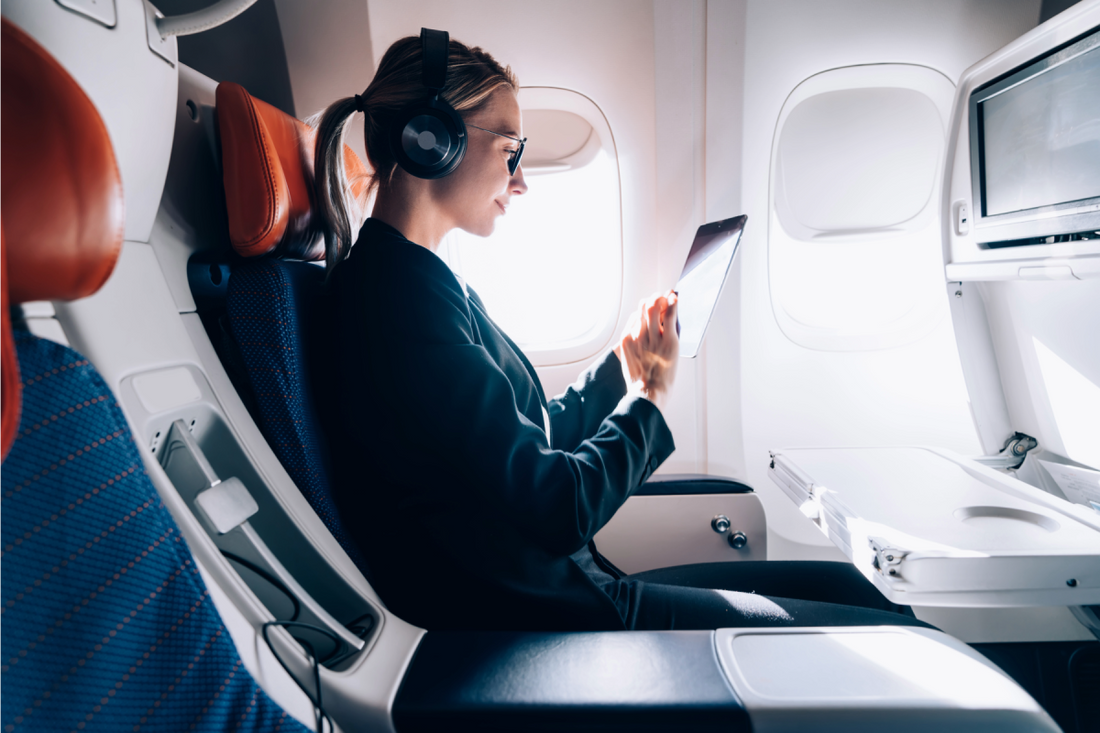
Travelling with Dry Eyes: Tips You Might Not Know
Share
If you have dry eyes, you’ll know how things can quickly turn from irritating to downright painful when you’re away. Dry cabin air, dusty hotel rooms, lack of sleep, new allergens, and a disrupted routine can throw your eyes into chaos.
For the seasoned traveller with sensitive eyes — whether you're off on a weekend away or in Europe for the month, this guide will help you prepare. We've gathered lesser-known dry eye travel tips and product suggestions (available at One Stop Dry Eye Shop) to help make your trip more comfortable.
1. Choose your seat strategically (yes, really)
If you’re flying, where you sit matters. Window seats may offer a view, but they're also the most exposed to the air conditioning vents along the side panels. Try booking an aisle seat, slightly away from the vent, and if you're lucky, one where you can dodge those overhead blasts of dry air.
Bring an eye mask or even use an eye compress to block both light and airflow. Soft, cushioned ones are best for preventing air currents from hitting your eyelids while you sleep.
2. Cabin air is dryer than the Nullarbor
Airplane cabins often have humidity levels of less than 20%. It’s no wonder your eyes feel like sandpaper.
Pack your favourite eye drops (always under 100ml for carry-on) and use them just before take-off and landing. Keep them in an easy-access pouch so you're not fumbling through your bag at 30,000 feet.
Recommended: Hylo-Forte Eye Drops — These are high-strength, preservative-free and come in a multi-dose bottle that's perfect for travel. They contain 0.2% hyaluronic acid, known for deep, long-lasting hydration and a 10ml bottle will last a long time while on holiday.
3. Don't forget eyelid hygiene (even on holiday)
Dry eyes often come hand-in-hand with blepharitis or inflamed eyelids. So skipping your lid hygiene routine such as foam cleansers or eyelid wipes just because you’re on holiday can undo all your good work.
Recommended:
Blephadex Eyelid Foam Cleanser — contains tea tree oil and coconut oil to gently remove debris and demodex mites. Perfect for home base.
Blephadex Eyelid Wipes — great for on-the-go use, and individually wrapped for convenience.
Both include ingredients shown to reduce inflammation and support lid hygiene.
4. Hotels and Airbnbs can be dry eye traps
That lovely air-conditioned room might be comfortable, but it’s not doing your eyes any favours. Dry air, dust, and unfamiliar allergens can irritate sensitive eyes.
- Ask your host to avoid scented linen sprays or cleaning agents if possible.
- Use a portable humidifier or place a damp towel over a chair overnight to boost humidity.
- Avoid sleeping under a direct aircon vent.
- At night, consider sealing in moisture with a protective eye gel.
Recommended: Optimel Manuka Forte Eye Gel — made with pharmaceutical-grade Manuka honey, this gel helps reduce inflammation and supports the natural microbiome of the eye surface. It can sting a little at first (just a heads-up), but studies show it has strong antimicrobial properties.
5. Sanitise smartly, especially if you're touching your face
When you're constantly reapplying drops or wipes, clean hands are a must. But most hand sanitisers are alcohol-based and can irritate your skin, especially if you accidentally touch your eyes. Consider a hypochlorous solution for your face and eyelids.
Recommended: Ocusoft Hypochlor Spray Solution — a gentle but effective antimicrobial spray that can be used around the eyes. It’s been shown to reduce bacteria linked to blepharitis and meibomian gland dysfunction.
6. Don't skip your routine just because you're away
It’s easy to ditch your routine while travelling. But keeping your eyes healthy on the road means sticking to your usual lid hygiene, drop schedule, and diet as much as possible.
Tip: Set a reminder on your phone if you're prone to forgetting. A little routine can go a long way, especially if you're managing MGD or moderate to severe dry eye.
7. Stay hydrated inside and out
We all know water matters, but travel dehydration happens fast — especially in airports and on hot tours. Carry a water bottle and make a habit of sipping regularly.
People also find oral omega-3 supplements or flaxseed oil such as Thera Tears Eye Nutrition help with tear film stability. While you're at it, eat plenty of fish, avocado, and nuts while abroad.
Wrap-up: Planning makes all the difference
Travelling with dry eyes doesn’t have to mean discomfort or stress. With a few simple changes — and the right products in your bag — you can enjoy your travels without the burn, itch or blurred vision.
Before your next trip, stock up on travel-friendly essentials from One Stop Dry Eye Shop. Your eyes will thank you at 5am in the airport lounge.
